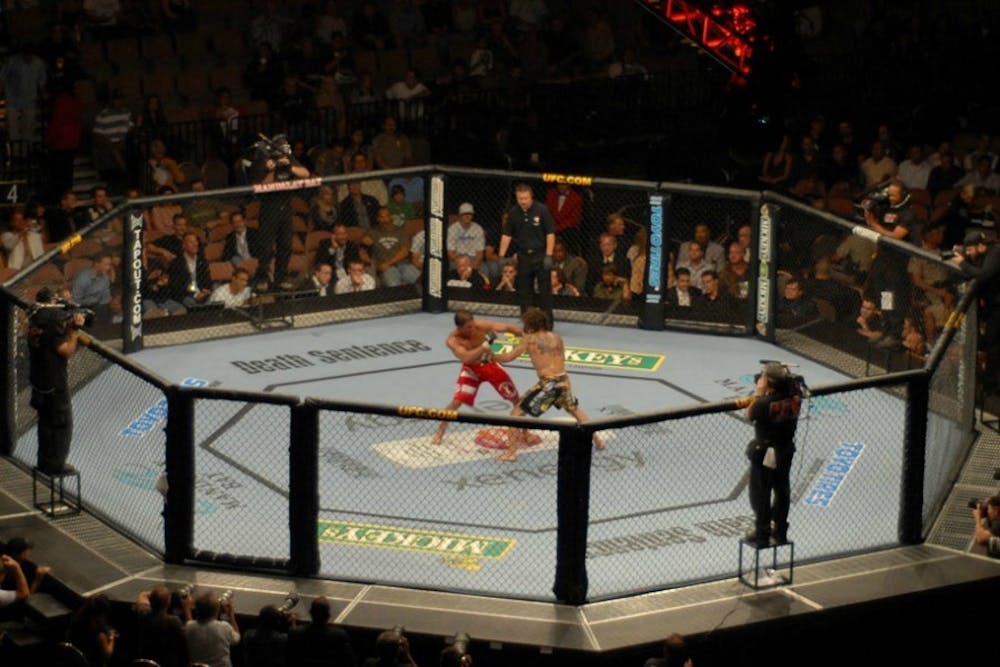By Julia Rivera, For The Miami Student
UFC star Conor McGregor faced Nate Diaz this past weekend in an epic welterweight fight in Las Vegas. In the second round, a bloodied Diaz forced McGregor to tap out, claiming his win. In the midst of the excitement of UFC 196, people have lost sight of one of the sport's biggest problems: domestic violence.
The national domestic violence arrest rate is 360 arrests per 100,000 men. In the NFL, it's 210 arrests per 100,000. But for the MMA, the rate is 750 arrests per 100,000. You would think a number that is double the national average would raise concern and force the sport to take action.
In 2015, HBO's "Real Sports with Bryant Gumbel" did a segment on domestic violence and MMA fighters. The piece centered on model Christy Mack and her ex-boyfriend, former UFC and Bellator fighter Jon Koppenhaver. Koppenhaver allegedly brutally beat Mack to the point of convulsions and is now potentially facing life in prison for 34 felony charges, including attempted sexual assault and strangulation. During his first hearing, Koppenhaver laughed during Mack's retelling of the alleged assault, clearly lacking any remorse.
The TV show explained that Mack isn't the only woman who fell victim to their MMA fighter boyfriends and revealed that background checks are not a requirement to fight MMA promotions. MMA fighter Jason Miller said he was not required to show a record, even though he had one. Similarly, Koppenhaver signed with Bellator while serving time on a felony assault conviction.
Why are these violent men being thrown into a violent sport without a problem? Would a man with a domestic violence record be allowed to work at a hospital or as a police officer? Absolutely not.
More often than not, the fighters being signed have a violent history. Though the sport itself is violent, it's not okay to ignore the fighters' violent pasts. The sport only fuels their aggression.
Fighters turn to illegal drugs such as steroids to perform better, but it comes at a cost. Some drugs cause violent outbursts and shorter tempers. When you add those performance enhancers with an already angry man who is capable of killing someone with his bare hands, you have a disaster.
The UFC doesn't seem to care what their fighters did in their pasts. Fine, we'll leave the past in the past. But, what happens when a fighter is accused of domestic violence while in the spotlight?
When light heavyweight fighter Thiago Silva was arrested after a domestic violence incident and a standoff with a SWAT team in February 2014, it appeared the UFC took a stance. UFC President Dana White said Silva would never fight for the UFC again. However, once the charges against Silva were dropped, he was graciously welcomed back to the UFC family.
When the ex-wife of heavyweight fighter Travis Browne accused him of domestic violence, the UFC temporarily suspended him. But the organization concluded its own investigation was "inconclusive," and Browne was reinstated.
According to a statement by the UFC, the investigator in the Browne case talked to nearly a dozen individuals about the abuse, and the evidence did not support his ex-wife's claims. Excuse me, but if a woman is abused by a man she loves she's not going to run around to family and friends and talk about it. She is most likely scared that talking will lead the man to beat her again, and it may be worse than the previous beating.
Enjoy what you're reading?
Signup for our newsletter
We're not talking about a normal man here. We're talking about a trained professional fighter putting his hands on a woman. These men are literally paid to beat the living crap out of someone else.
If the UFC doesn't change their policies, one of these men will seriously hurt someone -- maybe to the point of death. With little accountability and even fewer regulations barring previous offenders, it becomes too easy for a violent sport to harbor even more violent people.




